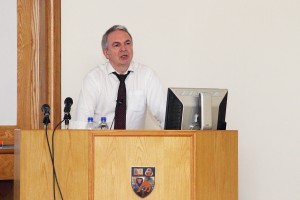
The inaugural London School of Economics (LSE)- NUS Public Lecture was hosted by FASS on March 25th with Professor Stuart Corbridge, Pro-Director of the LSE, delivering his lecture on ‘Good and Bad Inequalities: Or, When and Why Did India Take Off and Who Has Benefitted?’
Prof Corbridge is a specialist in development studies with a particular focus on the eastern states of India. In this ‘broad brush-strokes’ lecture he connected the remarkable overall growth story of India with the persistently high levels of poverty and inequality experienced, in particular, in many east Indian states. Various theoretical models for India’s growth were explored with a theory of ‘elite revolt’ emerging as the most satisfactory explanation. This concept suggests that the deep drivers of growth were due to a sustained series of initiatives at the government and state level which encouraged the elite business community (and later markets) to both abide by and circumvent the law (such as through bribery) to create conditions ripe for growth. These conditions allowed some reform to take place, but mostly within the realm of elite politics. These are the ‘good inequalities’ of the lecture title.
The ‘bad inequalities’ are more structured along class, ethnicity, gender, and caste and are the barriers towards equitable growth. These inequalities mean South Asia suffers from an elasticity of poverty that is not as efficient related to GDP growth as other global regions for lifting the poor out of poverty. The changes made at the federal (state) level have largely benefitted the western richer states exacerbating a form of ‘provincial Darwinism’ whereby the eastern states suffer little investment or economic growth. However, the domain of mass national-level politics, regarding agriculture, governance and power remains unreformed and this is where India’s future prospects for growth lie.
In conclusion, Prof Corbridge professed himself generally optimistic for continuing growth in India but also predicted continuing difficulties in negotiating political reform and even violent political struggles due to the pro-Maoist presence in the many eastern states which suffer from the undersupply of public goods and an endemic political vacuum.
Prof Corbridge’s lecture was part of his broader mission to strengthen ties between the LSE and NUS.